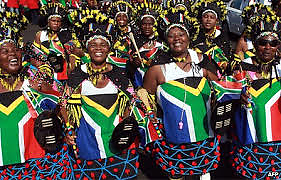South Africa was originally a Dutch Colony which was overtaken by the British in 1806. Since 1961 it has been a republic. South Africa’s modern history has been marred by the policy of apartheid (instituted in 1948 by the National party). Under apartheid the nation was racially segregated into whites, blacks, Asians and coloureds. Control of the government, land and economy was in the hands of the white minority elite. After a long and violent struggle with the African National Congress, the first fully democratic elections were held in 1994. Nowadays South Africa has 11 official languages. Although South Africa has overcome minority oppression, it faces many challenges as most of the economy is still in the hands of elite, rising xenophobia, emigration of educated whites, high unemployment and poverty rate and a high crime rate. The current president Jacob Zuma is facing corruption charges and several political controversies.
We will be working for one of the few black farmers in South Africa. Our project concerns the design and construction of a large scale biodigester. By finding a use for the large amount of waste in the region and providing to South Africa’s rapidly increasing energy demand he aims to hit two birds with the same stone.
We will be staying at a farm in Devon, Gauteng. Gauteng is the most diverse and populous region of the nation. Housing one of the capitals, Pretoria, and the largest city, Johannesburg. The name is devised from the Dutch word “Goud” and the Sotho suffix “-eng”. This is symbolic for the prominence of the mining industry in the region.
The farm is located at 1 hour driving from Johannesburg and fifteen minutes from the nearest township. The area is incredibly vast and empty. The climate is comparable to the Mediterranean and quite agreeable. Chance of malaria is very low, as the rainfall is low.
